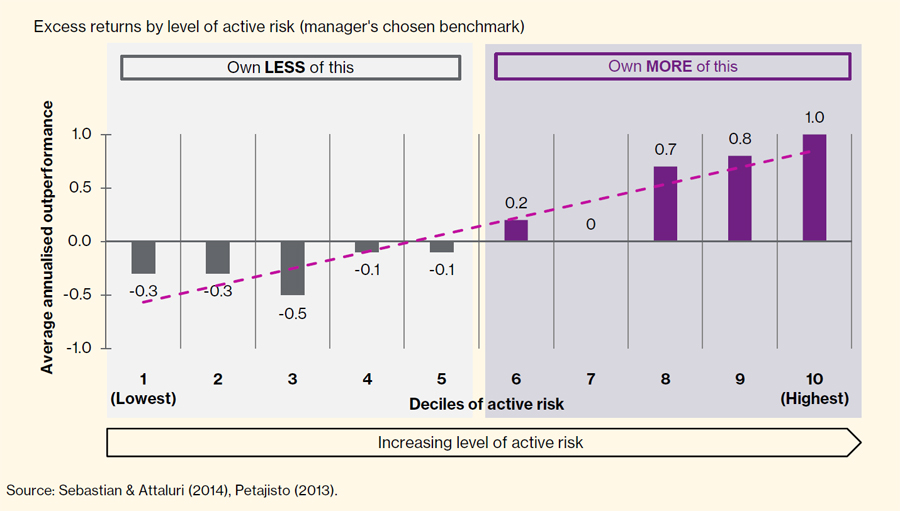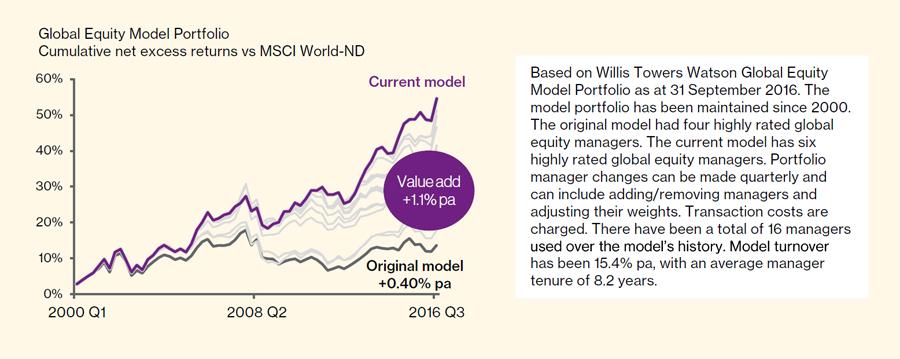Effective implementation and equity portfolio management
We propose that the recipe for maximising the odds of success in equity investing calls for:

Just as a great meal demands quality ingredients to begin with, the recipe for investment outperformance commences with the identification of high quality, skilled investors. This, however, is a challenging endeavour. A recent study1 found that passively managed strategies outperform active managers nearly 80% of the time in the long run, after fees are taken into consideration.
A common selection criteria used by asset owners for unearthing outperforming managers is past performance. We are sceptical of its merit as an indicator of skill and hence a predictor of future performance, as studies have shown that there is a high degree of randomness in short to medium term investment returns. In the words of Jiro, how do you develop a palate capable of discerning the good from the bad? The answer lies in a selection process that combines broad quantitative analysis with a rigorous evidence-based qualitative assessment of investment skill.
While this process may uncover a great talent, further work is required to truly enhance and balance this ingredient’s flavor.
For many years, restaurant establishments had been expanding their menus to become all things to all people, catering to an ever larger audience. Consider McDonald’s, which increased the number of items on its menu from 33 in 1990 to 121 in 2014 – a 267% increase2. This trend has reversed in the last few years, with the menu shrinking across the board. What happened?
Restaurants discovered that larger menus did not necessarily correlate with happier customers. Almost 80% of the profits came from only 20% of the menu items. Moreover, a long list of items detracted the Chef’s attention from his or her best ideas. Dishes which did not emphasise the Chef’s strengths and talents not only disappointed the customer, but also risked burning them out. Is the same scenario playing out in asset owner’s active equity portfolios?
The last few decades have seen a surge in popularity of “core” strategies with a large number of portfolio holdings. These managers utilise ‘fillers’ in their portfolio – lower conviction positions to make the portfolio more like the benchmark – so that the active risk is dampened. This reduces the potential for ‘excessive’ underperformance against the benchmark in the short term and makes these strategies more palatable for clients. While this may help the profitability of some asset management firms and protect their businesses from sharp drawdowns, asset owners often experience poor investment returns after fees.
Academic research3 suggests that concentrated products with higher active share are better able to overcome fees and deliver superior returns over time. A highly active portfolio that eschews the fillers and expresses conviction has a wider range of performance compared to the benchmark, but has greater odds of success in the hands of a skilled manager (Figure 1). At Willis Towers Watson, we have mandated some of the best managers in the world to create products for our clients that showcase only their highest-conviction investment ideas, disregarding short-term underperformance. While this may increase volatility at the individual manager level, overall portfolio risk can be better managed through an innovative way to structure portfolios.

Menu specialisation has gone hand in hand with another welcome innovation for food lovers – food halls. Although not a new concept, food halls transformed in recent years and compete in offering a range of high-quality eateries, each specialising in a particular cuisine. The premise is simple – each individual restaurant aims for a lasting impression on the customer, yet a varied assortment of specialist eateries under one roof offers the culinary diversity that can attract diners of all tastes and backgrounds.
Assembling a portfolio aiming to succeed in different market environments is not that dissimilar in concept. It is prudent to hire multiple managers since relying on a single one creates significant dependency and execution risk. Intelligently combining around 10 concentrated portfolios run by managers with different skills and approach diversifies the risk taken at the individual manager level (see Figure 2). As a result, overall portfolio risk is more palatable while the underlying portfolio consists purely of high conviction ideas without any ‘fillers’. This offers a better balance between risk and expected returns.

While no business is immune to uncertainty and risks, food establishments that do not respond swiftly to customer feedback expose themselves to greater peril. Likewise, asset owners cannot control their investment returns or eliminate uncertainty, but failing to respond to changing circumstances – shifts in the market environment or research views on individual managers – in a timely fashion can detract value by increasing opportunity costs and escalating losses. The typical schedule of decision-making for asset owners reflects the issue that portfolios are managed not in real-time but in “calendar-time”, leading to delayed investment decisions or slow execution.
Attempts by asset owners to dynamically manage the portfolio are sometimes reactionary to short term performance. The relatively common practice of selling underperforming managers to hire managers that have recently outperformed can destroy up to 2% p.a. of value on average4.
Good portfolio management requires experience in portfolio construction and risk management, ability to separate noise from skill in performance, and decisiveness in making portfolio changes when required. These skills are often beyond the capabilities of the average asset owner, who may wish to consider delegating/outsourcing some or all of these activities in order to improve outcomes. In Figure 3 we illustrate that effective portfolio management can generate substantial value add over time.

A penny saved is a penny earned, goes the saying. How can asset owners squeeze costs while still employing fund managers of the highest calibre, running a concentrated portfolio of their best ideas?
In our restaurant setting, downsizing the menu provides an opportunity to streamline the kitchen and increase cost efficiency. At Willis Towers Watson, we can leverage on our institutional clients’ pooled quality and size, and our long-term relationships with managers in exchange for substantial discounts on management fees. Additional savings can be made through better scale and management of other operating costs (for example, custody and administration). By selecting and committing to managers with long-term investment horizons that typically have low turnover, transaction costs can be kept low. In this way, the focused equity approach provides an opportunity to streamline costs, resulting in higher alpha potential after fees compared to the typical approach of implementing core portfolios.
The world of stock markets and gastronomy may seem like chalk and cheese, but success follows a similar recipe.
To succeed in the competitive world of active management, asset owners hungry for success need to go further than simply selecting managers.
By journeying from manager selection to portfolio construction and implementation, we discovered that the recipe for investment success calls for:
These extra ingredients may seem burdensome for the average asset owner with limited governance but can be managed effectively by delegation. After all, the difference between ordinary and extraordinary is just that: extra.
1 Based on a study by S&P Jones Indices LLC and the Center for Research in Security Prices. As of December 31, 2015.
2 “Fallen Arches: Can McDonald’s get its mojo back?” – Fortune, November, 2014.
3 Sebastian and Attaluri (2014), Petajisto (2013).
4 Based on a study by Research Affiliates on a sample of US Mutual Fund returns, 1991-2013.
Visit our Asia Insights on Better Equities mini-site to learn more about equity investing.
The contents of this article are for general interest. No action should be taken on the basis of this article without seeking specific advice.
Willis Towers Watson has a series of Advisory Portfolio Groups (APG) within the Investment line of business around the globe, based in the Americas, Asia, Australia, the UK and EMEA. The APG in Asia seeks to identify and develop best ideas and approaches that can offer a competitive advantage to Asian institutional investors, while spearheading Asian-focused investment research and portfolio construction advice. Further, the group is responsible for ensuring high quality and consistency of advice, and works with client teams to design portfolios.
This paper was written by members of the APG for general information purposes only.
Produced by:
Raashid Nayeem
Investment Consultant
Claire Shen
Senior Investment Analyst
Reviewed for APG by:
Fabio Cecutto
Head of Focused Equity
| Title | File Type | File Size |
|---|---|---|
| Portfolio matters: Improve your odds of success | .2 MB |